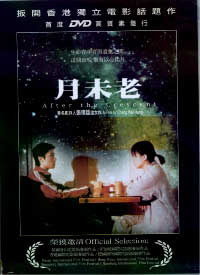After the Crescent

Reviewed by YTSL
As befits its “Eastern Hollywood” nickname, Hong
Kong cinema is primarily known for its market oriented output. If one
were to look around, however, some Jade Theatre offerings will be found that
don’t appear to have been made with large profit-making in mind. Among
these are documentary works (including by the likes of Stanley Kwan, Ann
Hui and Shu Kei). Then there are those efforts that could be considered
“indie” movies; even though they may have at least one popular film personality
on board (e.g., the Andy Lau produced “Made in Hong Kong”) and/or -- as was
the case with this HK$567,200 production whose director cum scriptwriter
the individual still may be best known for having scripted the deservedly
Category III rated “Run and Kill” -- turned out to have been funded by a
branch of the local government (i.e., the Hong Kong Arts Development Council).

Although this 1997 work is not without any acts of physical plus psychic
violence, it still is -- as befitting its non-criminal subject matter along
with source of funding -- a darn sight more cerebral as well as less bloody
than those which Bryan Chang had scripted but hadn’t helmed. Additionally,
and however unlikely it may seem when bearing in mind that he got his start
in the movie making business at Jackie Chan’s Golden Way Films Production
Company, the main man behind AFTER THE CRESCENT actually cites Fellini’s
“La Voce de la Luna”, some Buddhist scriptures and Tarkovsky’s “Sculpting
in Time” along with an astrology book -- which revealed to him “that the
moon is the governing planet of my horoscope sign” -- plus that satellite
of Earth itself as the chief inspirations behind his first directorial effort;
one that ambitiously sought to examine “the perplexities involved in the
process of growing up” (See the HKIFF’s “Hong Kong Panorama, 97-98’, 1998:77).

All of the leisurely paced AFTER THE CRESCENT -- on which Carol Lai, who
went on to direct “Glass Tears” some four years later, worked as production
manager -- takes place within a single day and night that happens to be “the
Lunar Fifteenth, the night of the full moon” (Ibid). During the twenty
four hour interval inside of which the moon gets deemed by the movie’s primary
character to be “so bright, so pretty”, the seventeen year old -- who is
named Meme Lam (and compellingly portrayed by Cherie Ho Pui-Yi) -- is shown
having to face a whole bunch of adverse conditions, not all of which are
solely her doing. And although the job- cum degree-less youth is not
without other close family members, it turns out that she cannot expect to
get much help from any of them; this on account of her father being on the
“weird” side (not least because he’s still mourning the unexpected passing
away of his wife some two years on), her elder brother Fai being “a bit slow”
and her younger brother Lok being but a(nother) far from ultra-responsible
love-sick teen.

Early on in this at times pretty experimental feeling effort, there is an
awkward as well as extended scene in an eatery (that, from the sound of things,
is located near a busy thoroughfare). O Sing Pui’s cinematography --
which makes copious use of long takes that “perfectly preserv[e] those squirmingly
awkward pauses we all face in daily life” (See John Charles’ review of AFTER THE CRESCENT
at “Hong Kong Digital”) -- as well as the spartan plus crammed tea house
setting play a big part in creating the feeling of discomfort that pervades
this main mood establishing section of the documentary style dramatic offering.
Nevertheless, what clearly is most responsible for the discordance that emanates
in waves from the unhappy individual at the center of the affair, the boyfriend
that she belatedly realized was hers no more and the gal who had become the
latest apple of his roving eye is the new state of romantic affairs that
they get revealed to be in.

As if it weren’t bad enough that Meme’s ex-love, Wah, is so openly under
the thumb as well as enamored by the more assured Clara, Meme turns out to
-- unbeknownst to her loved ones -- be two months pregnant. After independently
deciding to have an abortion, the troubled main personality in AFTER THE
CRESCENT -- who Bryan Chang described as “a teenage girl who has a life ahead
of her but is unable to grasp the meaning of it” (In the HKIFF’s “Hong Kong
Panorama, 97-98’, 1998:77) -- decides to go to an older friend (named Angela)
for financial assistance. Instead of money alone, Meme also finds herself
being presented by her nightclub worker pal with advice to keep the baby
plus hook a man into becoming its father.

Although a candidate shortly presents himself to her, Meme ends up not following
the plan outlined to her by the probably wiser as well as more experienced
female. This is not because there’s a set series of steps that she
is intent on alternatively pursuing. Instead, this listless youth’s
day and night -- and life as a whole for a while now -- looks to consist
of her going from one chance but fateful proving occurrence to another.
In much the same way as its self-hating protagonist, AFTER THE CRESCENT generally
comes across as feeling like it’s apt to wander and meander along a path
that’s far from predictable plus less than logical. While some might
admire this slackly structured approach, my own sense is that it is one that
often is more likely to result in dissatisfying mediocrity, if not outright
disaster.
My rating for this film: 6.






